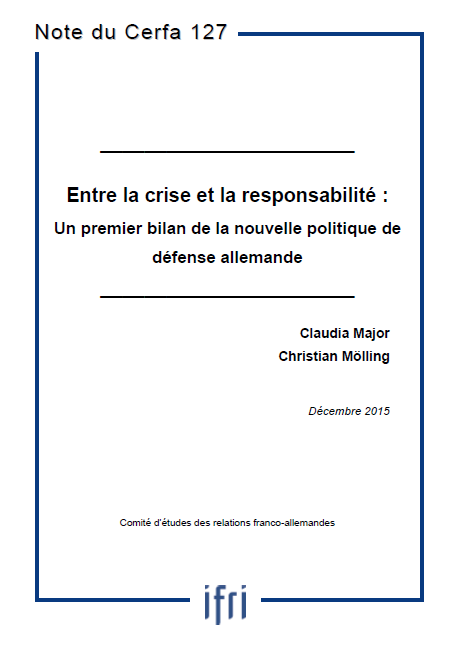Between crisis and responsibility: a first assessment of the new German defense policy

Since the speeches delivered by President Joachim Gauck, Minister of Foreign Affairs Frank-Walter Steinmeier and Minister of Defence Ursula von der Leyen at the 2014 Munich Security Conference, Germany has seen a debate on new responsibilities in its foreign and security policy.
This new ambition, changes in the international environment, and national challenges have combined to shape German policy ever since. Two years after the new government took office and formulated its ambitions, the time has come for an evaluation: In what respect and how has German defense policy changed?
Although much progress has been made, it is difficult to distinguish a homogeneous new policy. It appears that the evolution of defense policy is being driven to a large extent by both internal and external crises. A new “policy of responsibility” is mostly visible when it concerns matters where events or partners put pressure on German politics: operations and defense cooperation, Ukraine, ISIS, or the necessity to save on materiel.
At the same time, the debate on German responsibility has enabled the pressure on German security policy, resulting from the recent crises, to be channeled in the right direction: toward a greater German contribution to international security. The challenge now consists of merging the notion of “responsibility” and the crisis-driven pressure in a way that leads to the development of a new and coherent German defense policy. Defining what exactly assuming responsibility means, along with the necessary political, military and financial changes, will clarify the work that Berlin must still complete. It will also help to clarify the role lying ahead for Germany’s partners in security policy, who are hoping for even greater German engagement.
This paper is published in French – Entre la crise et la responsabilité : un premier bilan de la nouvelle politique de défense allemande
This paper is also published in German – Zwischen Krisen und Verantwortung: Eine erste Bilanz der neuen deutschen Verteidigungspolitik
Claudia Major is Senior associate of the Research Division “International security policy” at the German Institute for International and Security Affairs (Stiftung Wissenschaft und Politik).
Christian Mölling is Senior Resident Fellow at the German Institute for International and Security Affairs (Stiftung Wissenschaft und Politik).
Related centers and programs
Discover our other research centers and programsFind out more
Discover all our analysesMerz’ European Policy-making: The End of the ‘German Vote’?
Friedrich Merz’s European ambition is to turn Germany, long seen as hesitant into a leading actor within the European Union (EU). To that end, he has pledged to end the “German vote,” a phenomenon that epitomizes the paradox of a country both indispensable and frequently absent from European decision-making.

Securing critical raw material (CRM) value chains – a prerequisite for Europe’s technological resilience
At the heart of economic security, technological resilience is a backbone of the European Union’s (EU) competitiveness. The EU’s energy and digital transitions depend on critical raw materials (CRM).

Reconciling competitiveness and demographic change: a Franco-German imperative
France and Germany are facing parallel demographic shifts that could reshape the future of their economies and their social models. These shifts reflect broader European patterns but are magnified by the central role both nations play in EU governance and competitiveness.
Taking the Pulse: Does France's Political Crisis Weaken Europe's Geopolitical Hand?
While the EU tries to navigate a myriad international challenges, France is experiencing historic political disarray. What impact will instability in Paris have on Europe's geostrategic capacity?









